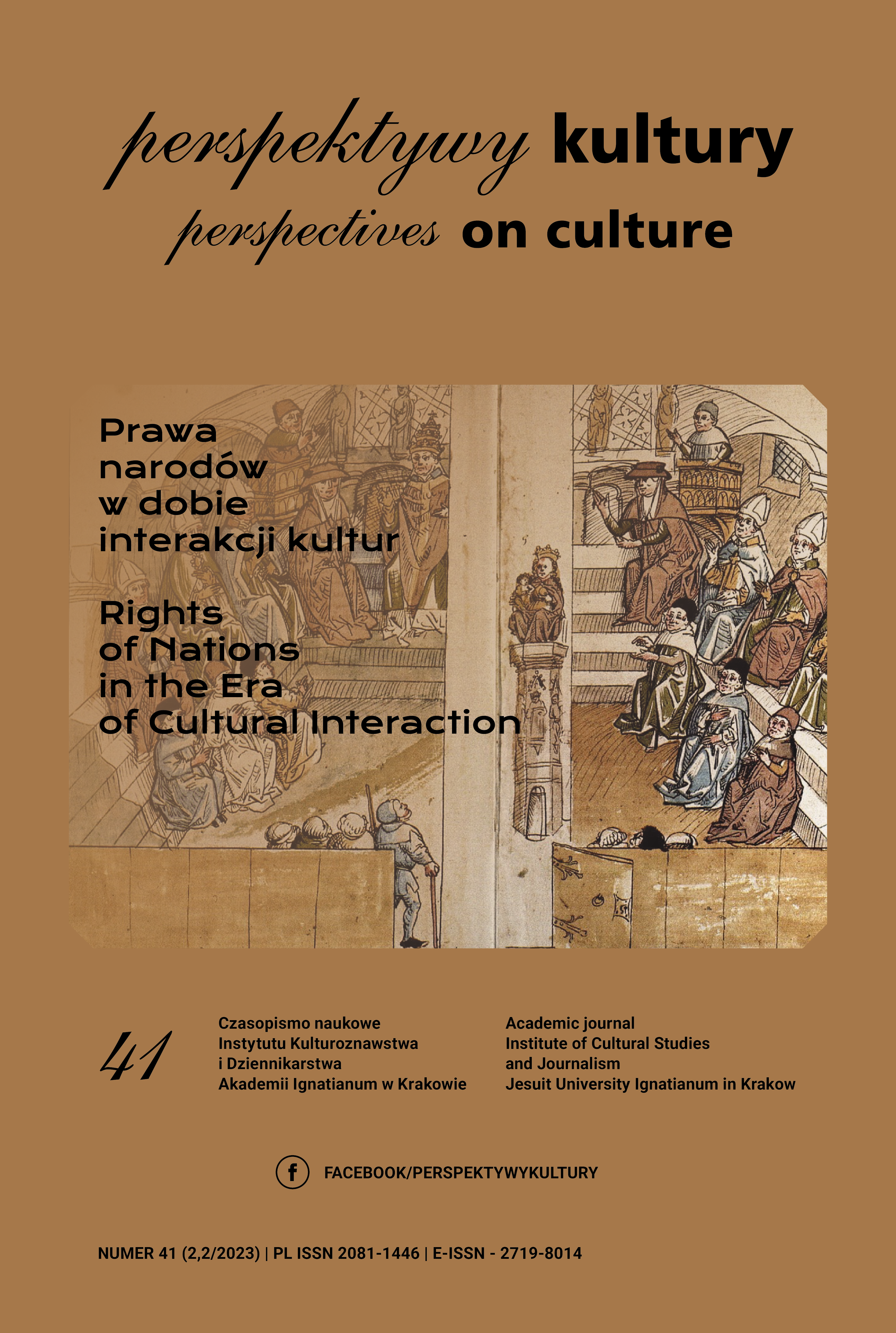The Rights of Communities in the Era of Virtual Cultural Interaction
Abstract
The modern world, thanks to the development of technology, has been expanded to include a virtual dimension, which, entering into relations with the classical dimension, has generated a hybrid reality. The expansion of reality by the virtual dimension has created a new space for the formulation and existence of communities, and even the emergence of peculiar quasi-communities, with different characteristics and fluid forms. This does not exclude communities that arise and are present in the hybrid world, that is, those that exist simultaneously in both real and virtual space. In contemporary deliberations, the issue of transferring communities from the real to the virtual and vice versa cannot be ignored, as it is becoming increasingly difficult to interpret the cultural phenomena of media civilization societies.
The emergence of a new augmented reality produces the need to change the understanding and interpretation of the processes that stimulate transgressions of human actions. Their consequences are creations that transcend the current boundaries of real space, and with their reach and impact also go beyond the virtual world. The new space has created different, unprecedented contexts for human action. The problem of the cultural rights of human communities in an expanded reality, with new rules of interaction, does not obliterate, but even exposes its importance due to more diverse forms of communicating, creating and experiencing identity, and the need for a more reflective, symbolically implicit definition of one’s values.
References
Arystoteles (2004). Polityka. Warszawa: Wydawnictwo Naukowe PWN.
Bauman, Z. (2006). Płynna nowoczesność. Kraków: Wydawnictwo Literac-kie.
Beck, U. (2004). Społeczeństwo ryzyka. W drodze do innej nowoczesności. Warszawa: Wydawnictwo Naukowe Scholar.
Bredvold, L.I., Ross, R.G. i Arbor, A. (1960). The Philosophy of Edmund Burke. Michigan: University of Michigan Press.
Castells, M. (2008). Siła tożsamości. Warszawa: Wydawnictwo Naukowe PWN.
Cohen, A.P. (2023). Symboliczne konstruowanie wspólnoty. Warszawa: Narodowe Centrum Kultury.
Hobbes, T. (1954). Lewiatan, czyli materia, forma i władza państwa ko-ścielnego i świeckiego. Warszawa: PWN.
Jaskuła, S. (2012). Symbioza i odrębność dwóch światów. Politeja. Jagiel-lońskie Studia Kulturowe, 2(20), 45–62.
Jaskuła, S. i Korporowicz, L. (2014). Kultury narodowe w procesie wirtua-lizacji. Politeja, 5(31/1), 7–30.
Maffesoli, M. (2008). Czas plemion. Schyłek indywidualizmu w społeczeństwach ponowoczesnych. Warszawa: Wydawnictwo Nau-kowe PWN.
Majer, A. (2010). Socjologia i przestrzeń miejska. Warszawa: Wydawnic-two Naukowe PWN.
Pyszczek, G. (2016). Floriana Znanieckiego wizja reorganizacji kulturowej. Humaniora. Czasopismo Internetowe, 1(13), 51–67.
Renaut, A. (2001). Era jednostki. Przyczynek do historii podmiotowości. Wrocław–Warszawa–Kraków: Zakład Narodowy im. Ossolińskich.
Sztompka, P. (2007). Zaufanie. Fundament społeczeństwa. Kraków: Wydawnictwo Znak.
Copyright (c) 2023 Jesuit University Ignatianum in Krakow

This work is licensed under a Creative Commons Attribution 4.0 International License.
Autor, zgłaszając swój artykuł, wyraża zgodę na korzystanie przez Wydawnictwo Uniwersystet Ignatianum z utworu na następujących polach eksploatacji:
- utrwalania utworu w formie papierowej, a także na nośniku cyfrowym lub magnetycznym;
- zwielokrotnienia utworu dowolną techniką, bez ograniczenia ilości wydań i liczby egzemplarzy;
- rozpowszechniania utworu i jego zwielokrotnionych egzemplarzy na jakimkolwiek nośniku, w tym wprowadzenia do obrotu, sprzedaży, użyczenia, najmu;
- wprowadzenia utworu do pamięci komputera;
- rozpowszechniania utworu w sieciach informatycznych, w tym w sieci Internet;
- publicznego wykonania, wystawienia, wyświetlenia, odtworzenia oraz nadawania i reemitowania, a także publicznego udostępniania utworu w taki sposób, aby każdy mógł mieć do niego dostęp w miejscu i czasie przez siebie wybranym.
Wydawca zobowiązuje się szanować osobiste prawa autorskie do utworu.





